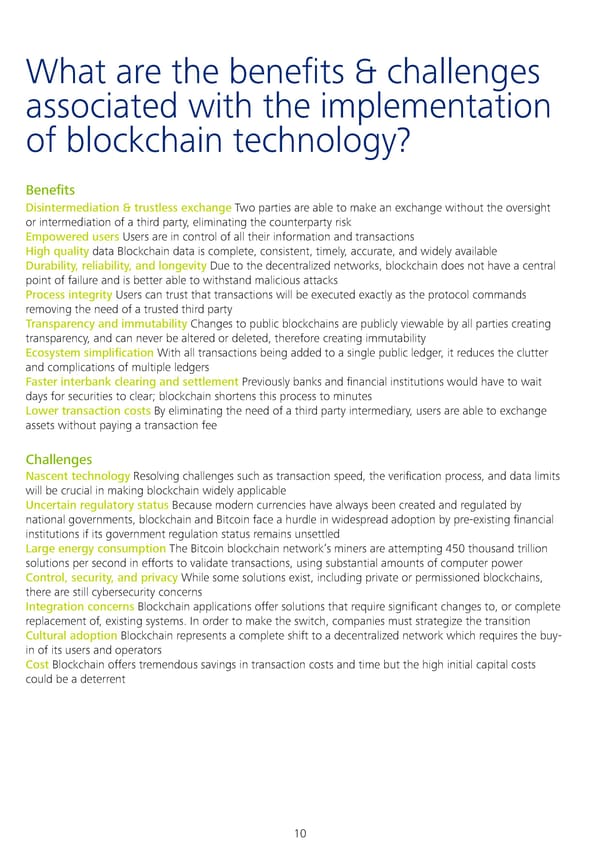What are the benefits & challenges associated with the implementation of blockchain technology? Benefits Disintermediation & trustless exchange Two parties are able to make an exchange without the oversight or intermediation of a third party, eliminating the counterparty risk Empowered users Users are in control of all their information and transactions High quality data Blockchain data is complete, consistent, timely, accurate, and widely available Durability, reliability, and longevity Due to the decentralized networks, blockchain does not have a central point of failure and is better able to withstand malicious attacks Process integrity Users can trust that transactions will be executed exactly as the protocol commands removing the need of a trusted third party Transparency and immutability Changes to public blockchains are publicly viewable by all parties creating transparency, and can never be altered or deleted, therefore creating immutability Ecosystem simplification With all transactions being added to a single public ledger, it reduces the clutter and complications of multiple ledgers Faster interbank clearing and settlement Previously banks and financial institutions would have to wait days for securities to clear; blockchain shortens this process to minutes Lower transaction costs By eliminating the need of a third party intermediary, users are able to exchange assets without paying a transaction fee Challenges Nascent technology Resolving challenges such as transaction speed, the verification process, and data limits will be crucial in making blockchain widely applicable Uncertain regulatory status Because modern currencies have always been created and regulated by national governments, blockchain and Bitcoin face a hurdle in widespread adoption by pre-existing financial institutions if its government regulation status remains unsettled Large energy consumption The Bitcoin blockchain network’s miners are attempting 450 thousand trillion solutions per second in efforts to validate transactions, using substantial amounts of computer power Control, security, and privacy While some solutions exist, including private or permissioned blockchains, there are still cybersecurity concerns Integration concerns Blockchain applications offer solutions that require significant changes to, or complete replacement of, existing systems. In order to make the switch, companies must strategize the transition Cultural adoption Blockchain represents a complete shift to a decentralized network which requires the buy- in of its users and operators Cost Blockchain offers tremendous savings in transaction costs and time but the high initial capital costs could be a deterrent 10
 Israel: A Hotspot for Blockchain Innovation Page 10 Page 12
Israel: A Hotspot for Blockchain Innovation Page 10 Page 12